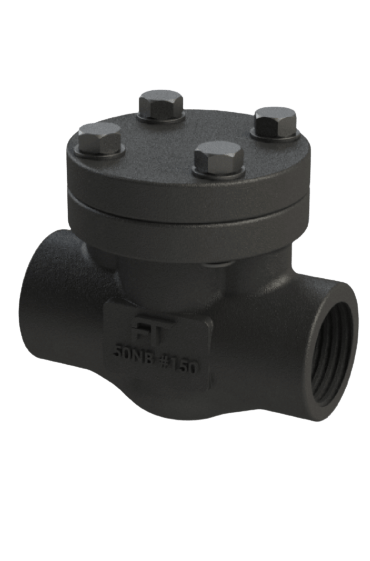Piston Check valves play a vital role in the safe and efficient operation of high-pressure steam systems. Industries such as power generation, chemical processing, and manufacturing rely heavily on steam for various processes, and controlling this high-pressure medium is essential for maintaining operational safety and system integrity. This article explores the role of piston Check valves in steam systems, their advantages over other valve types, and their contribution to enhanced efficiency and safety in high-pressure applications.
 |
| Piston Check Valve Manufacturer in Mumbai |
What is a Piston Check Valve?
It is a linear-motion valve used to regulate fluid flow by moving a cylindrical piston in and out of the valve body. In high-pressure steam systems, these valves are designed to withstand extreme temperatures and pressures while providing tight sealing and minimal leakage. The unique design of this valves allows them to offer superior performance in demanding steam applications where traditional valves may struggle to maintain a reliable seal.
It consist of three main components: the piston, valve body, and seats. The piston moves vertically within the valve body, and when in the closed position, it presses against the valve seats, forming a tight seal. When opened, the piston lifts, allowing steam to pass through. This simple yet effective design makes piston check valves a reliable choice for controlling steam flow in high-pressure systems.
Key Features
They offer several key features that make them ideal for use in high-pressure steam systems:
Tight Sealing: The piston’s ability to form a perfect seal with the valve seat ensures minimal leakage, even in high-temperature environments. This is critical in steam applications, where even small leaks can lead to energy loss and safety hazards.
Durability: They are constructed from high-quality materials, such as stainless steel and alloy steels, which can withstand the extreme temperatures and pressures associated with steam systems. This durability extends the life of the valve, reducing the need for frequent replacements.
Low Maintenance: The design of this valves minimizes wear and tear on critical components, making them relatively low-maintenance. In high-pressure steam systems, where downtime can be costly, the reliability of piston valves contributes to efficient operation.
Resistance to Corrosion: Steam systems often operate in harsh environments, where corrosion can be a significant concern. They are built to resist corrosion, ensuring consistent performance over time.
The Advantages of Piston Check Valves in High-Pressure Steam Systems
They offer several advantages over other types of valves, making them a preferred choice for controlling steam flow in high-pressure systems:
Leak-Free Operation: They are designed to provide a tight seal, preventing steam leaks. This is crucial for maintaining the efficiency of steam systems, as even minor leaks can result in significant energy losses over time.
Reduced Wear: Traditional valve designs, such as globe valves, rely on a metal-to-metal seal, which can lead to wear over time, on the other hand, feature a softer sealing surface that reduces wear and extends the valve’s lifespan.
High-Pressure Handling: In high-pressure steam systems, valve components are subjected to immense forces. They are specifically designed to handle these pressures, ensuring reliable performance and reducing the risk of system failure.
Energy Efficiency: By providing a tight seal and preventing steam leakage, piston valves contribute to the overall energy efficiency of the system. In industries where energy costs are a major concern, using this Check valves can lead to significant savings.
Versatile Applications: It can be used in a wide range of steam applications, from controlling flow in power plants to regulating steam in industrial boilers. Their versatility makes them an excellent choice for various industries.
Applications of Piston Check Valves in High-Pressure Steam Systems
They are used across multiple industries due to their ability to regulate steam flow in high-pressure environments. Some of the most common applications include:
Power Generation: In power plants, this valves control the flow of high-pressure steam used to drive turbines. Their ability to maintain a tight seal and withstand extreme temperatures makes them ideal for this demanding application.
Industrial Boilers: They are often used in industrial boilers to regulate the flow of steam to different parts of the system. Their reliability ensures the consistent operation of the boiler, preventing energy loss and equipment damage.
Chemical Processing: In chemical plants, steam is used for heating and other processes. They control the flow of steam, ensuring precise regulation and preventing system inefficiencies.
Steam Distribution Systems: In steam distribution networks, they help manage the flow of steam to various end users, ensuring efficient distribution and minimizing energy loss.
Enhancing Safety with Piston Valves
Safety is a critical concern in high-pressure steam systems, where even a minor failure can have catastrophic consequences. Piston valves contribute to enhanced safety in several ways:
Prevention of Leaks: Steam leaks can lead to energy loss, equipment damage, and safety hazards such as burns and explosions. Piston valves are designed to prevent leaks, ensuring that steam is contained within the system.
Pressure Management: Piston valves help regulate steam pressure within the system, preventing dangerous pressure build-ups that could lead to equipment failure or explosions.
Reliable Operation: In high-pressure steam systems, reliability is crucial. Piston valves offer consistent performance over time, reducing the risk of unexpected failures that could compromise the safety of the system.
Compliance with Safety Standards: Many industries are subject to strict safety regulations regarding the operation of steam systems. Piston valves are designed to meet or exceed these standards, ensuring compliance and reducing the risk of fines or penalties.
Maintenance Considerations for Piston Valves
While piston valves are known for their durability and low maintenance requirements, regular inspections and maintenance are still necessary to ensure long-term performance. Proper lubrication, cleaning of the valve seat, and periodic checks for wear and tear are recommended to keep the valve in optimal condition.
Additionally, choosing the right piston valve for your specific steam system is essential. Consulting with an experienced valve manufacturer can help ensure that you select a valve that meets the requirements of your application, contributing to both efficiency and safety.
Conclusion
Piston valves play a critical role in maintaining the efficiency and safety of high-pressure steam systems. Their ability to handle extreme temperatures and pressures, combined with their leak-free operation and durability, makes them a preferred choice for industries ranging from power generation to chemical processing. For businesses looking to invest in reliable and high-performance steam system components, Freture Techno is a leading Piston Check Valve Manufacturer in Mumbai, India




No comments:
Post a Comment